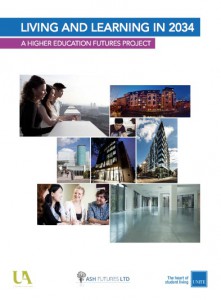Unite and Universities Alliance have just published a report on Living and Learning in 2034 which is relevant to the Digital Student project. Based on a year-long programme of scenario building (university_vision), the report explores how students might live in four different scenarios that might come about over the next 20 years.
As with a larger scale exercise I was involved with in 2009 – Beyond Current Horizons – the scenarios contrast a more competitive with a more collaborative future for UK society and HE. Alongside this the scenarios depict economic stagnation vs economic recovery as over-arching trends. We will be using a similar quadrant approach to scenario building in our first two consultation events, though the parameters will be different.
Key contemporary trends identified in the report include ‘stakeholder expectations’, ‘technological change’ and ‘access to information’, all of them seen as presenting challenges to the existing order. Confirming some of our own findings, the report notes that:
‘technology and changing social norms offer students new ways to engage with learning, much of it available for free… In the future, these changes may prompt a closer examination of the intangible benefits of a traditional residential university education alongside the use of online delivery methods.’
‘Decisions over [access to information] bring with them differing societal and economic consequences; for example, increasing or reducing the digital divide, enhancing or restricting the development of social media, and potentially bringing new stakeholders into the overall student experience.‘
These scenarios and the trends identified in the report are valuable tools for thinking about the context in which universities are responding to students, and in which students need new kinds of experiences from HE in order to succeed.


2 replies on “HE Futures report”
I’m looking forward to reading this report. Five years since I first started thinking about where education is going, and re-addressing the questions of what is the value of education!
Hello Bex, good to hear from you. You might like to check out the view of HE 2020 that we generated at one of our early consultation sessions – see Consultation Online under the menu for the link. Our recent ELESIG session confirmed for me that we are not in a good place to talk with students about what they can (should?) expect from their HE experience – including their digital experience – unless we are clear ourselves what the value is, and why it’s different from what’s on offer through an internet connection.